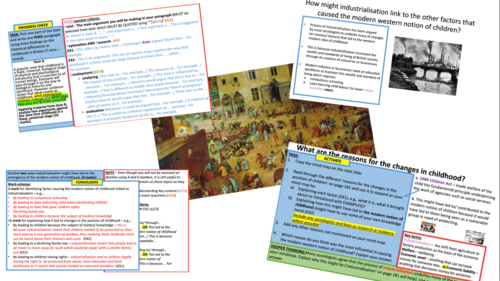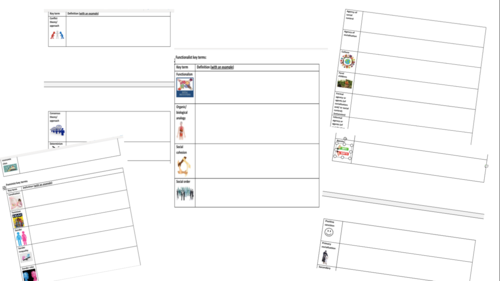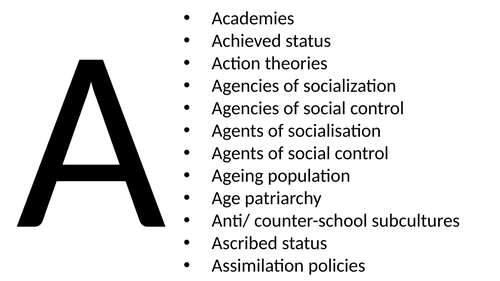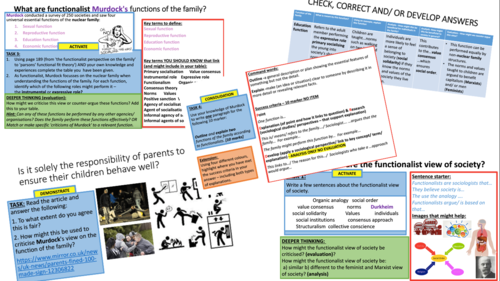
176Uploads
22k+Views
5k+Downloads
All resources

A-level AQA Families Topic 2 Childhood– The historical differences in childhood
Detailed and differentiated student-led lesson that explores Pre-industrial society, Industrialisation, Modern western notion of childhood, ‘cult of childhood’, Child-centredness/centred society , Infant mortality, as a way to examine Aries views and explanations of the historical differences in western childhood.
Activities require pages from the AQA A Level Sociology Book One Including AS Level: Book one 3rd Revised edition by Rob Webb, Hal Westergaard, Keith Trobe, Annie Townend
RESOURCES CAN BE FOUND AT THE END OF PPT
STUDENT-FRIENDLY MARK-SCHEME INCLUDED FOR 4 MARKER

AQA A-level Sociology: Education Topic 3 Ethnic differences Revision
Detailed and differentiated (up and down) student led lesson that:
uses scaffolding to guide students in making a mind-map of the topic as a revision material
-recaps the success criteria for 10 markers with item
-provides a model paragraph for a 10 marker item on this topic
-uses scaffolding to help students write their own 10 mark (item) paragraphs or full answers.
-includes 4 different 10 markers (with item). for this topic
NOTES -RESOURCES CAN BE FOUND AT THE END OF THE PPT.

AQA A-level Sociology -Developing AO3 skills - Explicit criticisms and explained analysis
Detailed student led lesson on what is meant by explicit (vs juxtaposed) criticisms and explained analysis and how to demonstrate these high level AO3 skills needed for A*-A answers for AQA exams. The lesson is adapted to stretch and challenge the most able whilst scaffolding to allow pupils who need support the opportunity to access higher level thinking.
INCLUDES:
SIX MODEL PARAGRAPHS- from theory and methods (postmodernism and Marxism), methods in context, crime (punishment), media and family. THOSE WHO DO NOT TEACH FAMILY OR MEDIA will have 4 model paragraphs in total)
ANSWERS FOR ACTIVITIES
AfL
A 7 page information sheet on explicit criticisms and explained analysis from the skills booklets (can be bought separately - includes other guidance and skills for preparing for exams) that explain the two different skills, success criteria with sentence starters of how to demonstrate each and provides brief examples (of explicit criticisms, juxtaposed criticisms, explained analysis, analysis that is limited to an isolated statement). Also includes analysis guidance and sentence starters for research methods paragraphs and guidance of how students might go even further by explaining their criticisms.
**NOTE **- Activity on slide 8 is challenging. If students struggle too much with it, show answers on slide 9 and move onto the progress check activity that will make clearer how explicit criticisms are written.
**NOTE ** -The focus of evaluations are criticisms for this lesson
RESOURCES CAN BE FOUND AT THE END OF THE PPT (AND INFO SHEET FROM SKILLS BOOKLET IS ATTACHED AS A WORD DOC)

AQA A-level Sociology Education Topic 5 Role of education - Marxist view
Detailed student led lesson on the Marxist views of the role of education adapted to stretch and challenge the most able whilst scaffolding to allow pupils who need support the opportunity to access higher level thinking.
Covers the following Marxist key functions of education: reproducing class ienquality, legitimising class inequality, correspondence principle,
Covers the following functionalist sociologists: Althusser, Bowles and Gintis and Willis
Covers the following key term:
State apparatuses
Ideological state apparatuses
Repressive state apparatuses
Ideology
Correspondence principle
Hierarchy
Alienation
Fragmentation
Extrinsic reward
Competition
Promotes a spiral curriculum by making links to key terms that students might have previously been taught within the education unit and for Marxism as a theory that link to this lesson.
Makes links to methods in context 20 marker - provides scaffolding and possible questions that link to Willis’ study.
Promotes, facilitates and scaffolds Oracy.
Provides guidance for answering 4 markers.
Uses and refers to ’ AQA A Level Sociology Book One Including AS Level: Book one 3rd Revised edition by Rob Webb, Hal Westergaard, Keith Trobe, Annie Townend ’ textbook
DETAILED ANSWERS INCLUDED FOR THE MAIN ACTIVITIES ON THE FUNCTIONS OF EDUCATION ONLY
NOTES -RESOURCES CAN BE FOUND AT THE END OF THE PPT.

GCSE Sociology – Introduction to functionalism
Explores value consensus, social order, biological/ organic analogy, structuralism, consensus theories and social cohesion as way of introducing students to the key main functionalist views and ideas.
3 marker with a success criteria and student friendly mark-scheme
Includes answers for main activities
Resources can be found at the end of the PPT.
Made to meet the AQA spec but can be used (and edited if needed) for other specs

AQA GCSE Sociology - Research methods - Structured and Unstructured interviews
Detailed lesson with lots of scaffolding based on adaptive teaching that help students understand the advantages and disadvantages of using interviews for investigating sociological issues (e.g. identifying the different types of interviews and their features, explaining the strengths and weaknesses of structured and unstructured interview and be able to apply out knowledge of the strengths and weaknesses of structured and unstructured interviews to 4 markers).
Covers the following key terms: Structured interview, Unstructured interview, Semi-structured interview, Group interviews (Focus groups), Interviewer bias/ effect, Interview schedule
This lesson introduces students to all types of interviews but only looks at the strengths and weaknesses of structured and unstructured interviews.
ANSWERS TO MOST ACTIVITIES INCLUDED
RESOURCES CAN BE FOUND AT THE END OF THE PPT

AQA GCSE sociology - Research Methods: Observations
Detailed lesson with lots of scaffolding based on adaptive teaching that help students understand what are the strengths and weaknesses of using observations to investigate sociological issues (e.g. identifying the different types of observations and their main features, explain the strengths and weaknesses of using the different types of observations to investigate sociological issues and to apply our knowledge of strengths and weaknesses of one or ore observations to an exam question.
Covers the following key terms:
Observation
Participant observation
Non-participant observation
Covert observation
Overt research
Hawthorne / Observer effect
Observation schedule
Overt research (extension)
Covert research (extension)
Key terms you should know that link:
Pre-determined - Closed questions - Open questions - Quantitative data vs
Qualitative data - Reliable vs Valid - Practical issues - Ethical issues - Theoretical issues - Positivism vs Interpretivist - Sample size - Representative sample - Generalise findings - Respondent - Standardised
ANSWERS TO ALL ACTIVITIES INCLUDED
Includes an exam style 4 marker with scaffolding and a detailed student friendly mark-scheme
Does NOT cover structured and unstructured observations as it is not in the specification and its quite complex.
Includes a key term sheet and definitions

AQA A-level Sociology - Media: The globalisation of popular culture
Detailed lesson with lots of scaffolding based on adaptive teaching that help students understand what impact might globalisation have on popular culture and what role might the media have in this (e.g. how to describe globalisation and identify the impact it has had on popular/mass culture,
To explain the impacts of a global popular/ mass culture and the role of the media in creating it using real-life examples and to analyse and evaluate the impacts of a global popular/ mass culture and the role of the media in creating it).
Covers the key following terms: Globalisation, Cultural homogenisation , Global culture, Cultural imperialism , media imperialism, Transnational, The Culture-Ideology of Consumerism, Cocacolonisation
Covers key terms you should know that might come up:
Popular/ mass culture, High culture, Low culture, Culture, Cultural products, Norms, Values, Subculture, Cultural capital
Covers key sociologists: Strinati/Giddings/ Postmodernists, Kellner/Sklair/ Flew, Sklair/ Ritzer, Sklair
Based on the information in textbook - 'SOCIOLOGY For AQA Volume 2 by Browne, Blundell & Law **
INCLUDES ALL ANSWERS FOR MAIN ACTIVITIES
INCLUDES A KEY TERM AND DEFINITIONS SHEET
Includes an exam question with scaffolding
RESOURCES CAN BE FOUND AT THE END PPT

AQA GCSE Sociology -Education Revision lesson
Description allows students to recap the key terms and sociologists covered in the education unit and apply this to exam questions. Goes through the different types of 4 marker (excluding research methods 4 markers) students can be asked.
ANSWERS TO MOST ACTIVITIES

AQA GCSE Sociology- Research methods-Official and non-official statistics
Detailed lesson with lots of scaffolding based on adaptive teaching that help students understand the difference between official and non-official statistics, the advantages and disadvantages of using official and non-official statistics to investigate sociological issues or topics.
Key terms included: Official statistics, non- official statistics
Key terms and studies you should know what link: The Millenium Cohort Study (MCS)– The British Cohort Study (BCS) - Secondary vs primary methods and data – Data - Quantitative vs qualitative data
Answers to main activities included
includes key term and definition sheet for the lesson
Resources can be found at the end of the PPT

AQA GCSE Sociology- Research Methods - Case studies
Detailed lesson with lots of scaffolding based on adaptive teaching that help students understand how to describe a case study and how it might be used to investigate sociological issues, explain the advantages and disadvantages of using a case study to investigate sociological issues.
Covers the following key terms: Case study, Mixed methods, Triangulation
Key terms and studies you should know that link: Secondary vs Primary methods and data, data, Quantitative vs Qualitative data
Resources can be found at the end of the PPT
Answers to all activities
Includes key term and definition sheet for the lessons

AQA A-level Families - Couples: Money management and decision making
Detailed and differentiated (up and down) student-led lesson that examines and analyses the following key terms to examine how money might be managed and how decision-making might be organised in families : Power, The allowance system, Pooling, Cultural/ Ideological explanation (of decision making), Material/ Economic explanation of inequality (of decision making),Personal life perspective (of money)
Examines the views of the following sociologists:
PAHL AND VOGLER (1993), Barret and McIntosh, Kempson, EDGELL, Laurie and Gershuny, CROMPTON AND LYONETTE, Pahl
***** Makes reference to other key terms students might know that link. **
***** ANSWERS for MAIN activities INCLUDED****
Uses and refers to ’ AQA A Level Sociology Book One Including AS Level: Book one 3rd Revised edition by Rob Webb, Hal Westergaard, Keith Trobe, Annie Townend ’ textbook
Bundle

AQA A-LEVEL Sociology Education: Topic 3 - Ethnic differences - LESSONS, REVISION & KEY SHEETS
INCLUDES THE FOLLOWING:
1. LESSONS:
L1 - Cultural deprivation
Detailed and differentiated (up and down) student led lesson that introduces students to ethnic differences in achievement and explores how different aspects of cultural deprivation (language, attitudes and values, and parental structure) might cause ethnic differences in achievement. To do this, the lesson explores the following key terms: ethnic group, ethnic differences in achievement, cultural deprivation, compensatory education and makes reference to other key terms students should have previously learnt (restricted code, working-class subculture, meritocracy, internal vs external factors, cultural vs material factors)
Uses and refers to ’ AQA A Level Sociology Book One Including AS Level: Book one 3rd Revised edition by Rob Webb, Hal Westergaard, Keith Trobe, Annie Townend ’ textbook
ANSWERS FOR MAIN ACTIVITY CAN BE FOUND ON NEXT SLIDE AFTER ACTIVITY SLIDE
*STUDENT FRIENDLY MARK-SCHEME FOR 4 MARKER INCLUDED
L2 - Material deprivation and racism in wider society
Detailed and differentiated (up and down) student led lesson on how a. material deprivation and b. racism in wider society might cause ethnic differences in achievement. Makes reference to key terms material vs cultural factors, external vs internal factors, the meaning/ patterns of ethnic differences in achievement.
Uses and refers to ’ AQA A Level Sociology Book One Including AS Level: Book one 3rd Revised edition by Rob Webb, Hal Westergaard, Keith Trobe, Annie Townend ’ textbook
ANSWERS FOR MAIN ACTIVITIES CAN BE FOUND ON NEXT SLIDE AFTER ACTIVITY SLIDE
INCLUDES ORACY ACTIVITY
L3 - Negative labelling and teacher racism
Detailed and differentiated (up and down) student led lesson that explores the following so students are able to understand and explain how negative labelling and teacher racism might cause ethnic differences in achievement:
Ideal pupil identity , Pathologised pupil identity, Demonised pupil identity, Colour-blind teachers, Liberal chauvinist teachers, Overt racist teachers, Rebels subcultures, Conformist subcultures, Retreatist subcultures, Innovators subcultures
Differentiates between Gillborn and Youdell (or Bourne or Olser), Sewell, Mirza’s view of how teachers might be racist and how this might affect achievement for different groups.
Lesson makes links to the following terms that students should have covered before completing this lesson: Labelling, Self-fulfilling prophecy, Streaming, Streams A-C economy, Educational triage, Interactionism vs Structuralism, Stereotype, Ethnicity Cultural deprivation Collectivism vs individualism.
**NOTE – Students will need to have basic to reasonable knowledge of labelling and the self-fulfilling prophecy. **
Uses and refers to ’ AQA A Level Sociology Book One Including AS Level: Book one 3rd Revised edition by Rob Webb, Hal Westergaard, Keith Trobe, Annie Townend ’ textbook
L4 - Institutional racism
Detailed and differentiated (up and down) student led lesson that explores the following so students are able to understand institutional racism and explain how it might cause ethnic differences in achievement: Institutional racism, Marketisation (extension), The New IQism, Ethnocentric, Ethnocentric curriculum, Model minorities, The foundation stage profile (FSP), Aim Higher initiatives/ programmes
Covers the ideas of Troyna and Williams Gillborn, David, Ball, Sewell (as a criticism)
Covers criticisms of Gillborn’s arguments
Includes answers for MOST activities - NOTE - NO ANSWERS FOR ‘DO NOW’ but can be done on the board with students.
Makes some links to the following key terms students should know:
Internal vs External factors, Cultural vs Material factors, Social processes, Labelling, Streaming, Self-fulfilling prophecy
NOTE:
**** RESOURCES FOR LESSONS CAN BE FOUND AT THE END OF PPT
**USE and refers to ’ AQA A Level Sociology Book One Including AS Level: Book one 3rd Revised edition by Rob Webb, Hal Westergaard, Keith Trobe, Annie Townend ’ textbook
**2. REVISION LESSON **
Detailed and differentiated (up and down) student led lesson that:
uses scaffolding to guide students in making a mind-map of the topic as a revision material
-recaps the success criteria for 10 markers with item
-provides a model paragraph for a 10 marker item on this topic
-uses scaffolding to help students write their own 10 mark (item) paragraphs or full answers.
-includes 4 different 10 markers (with item). for this topic
3. KEY TERM SHEETS
Alphabetical key term sheet for AQA A-level Sociology Education Topic 3 ethnic differences in achievement that requires students to fill out the definitions themselves.
*** Includes scaffolding, e.g. some sentence starters (to model to students how to incorporate key sociologists into their definitions) and prompts to help students remember how key term links to the topic. **
*** Includes a section with key terms that students should know from previous learning(links to key terms covered in class differences in achievement, e.g. labelling, pupil identities, material deprivation, speech codes etc) that link to this topic. **
DOES NOT INCLUDE IN TABLE key terms covered in Topic 1 & 2 Class diff key term sheet, e.g. labelling and the self-fulfilling prophecy
Good form of revision for students and can be used as a revision resource to develop AO1 once filled out.
**BASED ON CONTENT textbook - AQA A Level Sociology Book One Including AS Level: Book one 3rd Revised edition by Rob Webb, Hal Westergaard, Keith Trobe, Annie Townend ’ textbook
**4. KEY SOCIOLOGISTS SHEET **
Alphabetical list of sociologists who attempt to explain ethnic differences in achievement. SOME scaffolding with some sentence starters, prompts to help students with what some sociologists might says and put into external vs internal factors categories .
Requires students to write done what key sociologists from the topic ethnic differences in achievement (external and internal factors).
Good form of revision and revision resource for the students.
**BASED ON CONTENT in textbook - AQA A Level Sociology Book One Including AS Level: Book one 3rd Revised edition by Rob Webb, Hal Westergaard, Keith Trobe, Annie Townend ’ textbook

AQA GCSE & A-LEVEL Sociology Intro Key term Sheet
8 page key term sheet that includes:
Basic sociological terms needed to understand behaviour
Basic functionalist terms
Basic Marxist key terms
Basic feminist key terms
Includes some images that illustrate some of the key terms above
Made to meet AQA GCSE spec but can be used (and easily edited) for other exam boards AND for A-level

AQA A-Level Sociology Methods in Context PLC (EDITABLE)
Personal Learning Checklist for the methods in context unit in the the AQA A-level Sociology syllabus. PLC includes topic and page numbers from the Westergaard and Townsend book one for content students my find hard to locate.

Sociology Display - A-Z Key terms (YEAR 1)
A-Z list of key sociological terms for:
Education
Family
Research Methods
Could not think of key terms for letters: W, K, J, Z, Y, Z
Made for AQA A-level but can be modified for ANY SPEC and for GCSE.

Sociology Display -Labelling, Streaming, Differentiation, Polarisation & school subcultu
Ready to print display that shows the relationship between labelling, streaming, differentiation, polarisation, and anti and pro-school subcultures.
Specific to AQA A-level Sociology but can be simplified for GCSE or edited for another spec.
Bundle

KEY TERMS SHEET - AQA A-level Sociology Education: Topics 1-5
Alphabetical key term sheet for AQA A-level Sociology Education Topics 1-5. Contains the main key terms used in Topic 1-6 of the education unit for AQA A-level Sociology:
-Topic 1 - Class differences in achievement (external factors)
-Topic 2 - Class differences in achievement (internal factors)
-Topic 3 - Ethnic differences in achievement
-Topic 4 - Gender differences in achievement
-Topic 5 - Role of education
-Topic 6 - Education policy
*** Includes scaffolding, e.g. some sentence starters (to model to students how to incorporate key sociologists into their definitions) and prompts to help students remember how key term links to the topic. **
*** Includes a section with key terms that students should know from previous learning (for topic 3 sheet ethnic differences - this would be terms that link to key terms covered in class differences in achievement, e.g. labelling, pupil identities, material deprivation, speech codes etc) that link to this topic. **
Good form of revision for students and can be used as a revision resource to develop AO1 once filled out.
**BASED ON CONTENT textbook - AQA A Level Sociology Book One Including AS Level: Book one 3rd Revised edition by Rob Webb, Hal Westergaard, Keith Trobe, Annie Townend ’ textbook

AQA A-level Sociology Families: Theories of the family - Murdock’s four functions of the family
Detailed and differentiated (up and down) student-led lesson that recaps the functionalist view of society and examines and evaluates functionalist Murdock’s four functions: Sexual function , Reproductive function , Education function , Economic function.
Lesson makes links to other functionalist and family key terms that students might have previously been taught.
Main activity makes reference to AQA A-level Book 1 by Townsend but an alternative book that covers this content can be used.
MAIN ACTIVITY INCLUDES ANSWERS
Starter assesses prior learning on Childhood topic.
WORKSHEETS AT THE END OF THE PPT

WRITING FRAME - AQA A-level Sociology: Families – Topic 5 Changing patterns (divorce) 20 marker
Detailed writing frame that scaffolds (from introduction to conclusion) a full answer for a 20 marker on divorce (family -topic 5 changing family patterns). Models how to use the item to select points or arguments to answer the question.
*** Based on AQA specification**
Supports students with planning the 20 marker - using planning success criteria.
Outlines the success criteria and provides sentence starters for the full essay (intro, main body and conclusion). Success criteria used for paragraphs in main body of essay is PEELE/A
Outlines the key terms, sociologists, theories that can be used when answering the question.
Supports students who need support and guidance with writing essays whilst providing students who are already good at writing essays opportunities to further improve their essay skills.




















